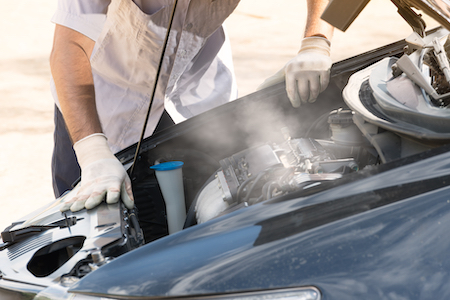There are many advantages to buying a new car. When everything is new, the chances of a problem occurring while on the road are minimal.
Of course, new cars face whatever is on your daily commute. Weather. Potholes. Aggressive drivers. Climbing mountains and zipping around town. Eventually they wear down.
You start to notice it in the little things.
When all systems are running smoothly, it’s smooth sailing. But sometimes, the unexpected occurs: your engine overheats.
To an auto enthusiast or an experienced mechanic, the reasons might be clear, yet for many, the cause and solution can be an elusive mystery.
What can it be? And more importantly, what can you do?
What Happens When an Engine Overheats
Have you ever experienced an engine overheating before?
Engine overheating is when the engine temperature escalates beyond the normal range, compromising the functionality and safety of the vehicle. The overheating can result in warped parts, head gasket failure, or even a cracked engine block, all of which are as daunting and expensive as they sound.
In a nutshell, an overheating engine is not just a minor hiccup, but a critical concern that demands immediate attention. Acting quickly is your best course of action.
Causes of Engine Overheating, Explored
Why would an engine overheat? Understanding the why before the how is pivotal. The causes of engine overheating range from easily fixable to technically complex issues. Let’s explore them:
Low Coolant
A fundamental cause for overheating is low coolant levels, depriving the engine of the essential medium that absorbs and dispels heat through the radiator. Coolant levels can drop due to leaks, evaporation, or simply over time with usage. Regularly checking and maintaining coolant levels are paramount to ensuring a consistent temperature within the engine.
Coolant Leak
Leaks can occur in several locations within the cooling system: the radiator, hoses, water pump, head gasket, or thermostat housing. Traces of dried coolant, usually bright green, pink, or orange, may hint towards a leak source. Leaks contribute to decreased coolant levels, diminishing the system’s ability to manage engine temperature.
Low Coolant Pressure
Optimal coolant pressure ensures the fluid efficiently travels through the cooling system, absorbing, and discharging heat. The pressure cap maintains this pressure, and its failure or a leak within the system can jeopardize the pressure stability, impairing cooling capabilities.
Low Oil
Engine oil wears many hats, one of which includes absorbing excess heat from the engine. When oil levels plummet, its ability to act as a heat absorber is compromised, placing additional heat management demands on the coolant and, in tandem, accelerating wear on moving parts due to insufficient lubrication.
Thermostat Problems
Acting as the cooling system’s regulator, the thermostat controls the coolant flow between the engine and the radiator. A malfunctioning thermostat may fail to open, hindering coolant flow and causing the engine to overheat. Its consistent performance is crucial for maintaining an equilibrium in engine temperature.
Broken Fan
The fan assists in maintaining a steady temperature in the radiator and, subsequently, the engine. A malfunctioning fan, due to a faulty motor, damaged fan belt, or debris, compromises the system’s cooling efficacy, allowing heat to build up within the engine.
Damaged Radiator
The radiator, tasked with dissipating the heat from the coolant, is a pivotal component in preventing overheating. Physical damage, internal corrosion, or blockages can impair its functionality, diminishing its ability to expel heat and maintain a balanced engine temperature.
Broken Water Pump
Often dubbed the heart of the cooling system, the water pump circulates coolant through the engine and radiator. Its failure, through a leak, broken impeller, or shaft issues, disrupts coolant flow, jeopardizing the entire cooling process.
How to Fix an Overheating Engine: Diving Deeper
That’s a lot that can go wrong! But don’t worry; maintenance is key to prevention. That’s why it’s important to find a trustworthy auto repair shop early in your ownership, and partner with them to ensure your car runs smoothly.
If by chance you do face an overheating engine, let’s dive into some troubleshooting and fixes:
Check Fluid Levels
Begin with the basics: inspect the coolant and oil levels. Initial checks should always encompass evaluating the coolant and oil levels, ensuring they adhere to manufacturer guidelines. Additionally, observe the color and consistency of the fluids to rule out contamination.
Pressurize the System to Look for Leaks
Utilizing a pressure tester can be invaluable in identifying leaks within the cooling system. Pressurizing forces coolant out through leaks, providing a tangible indication of the problematic area. (You don’t have to buy one if you don’t want to. That’s why partnering with a mechanic has its advantages.)
Check for Damage
A visual inspection can unveil apparent issues, such as leaks, damaged hoses, or corroded surfaces. Regular checks can preemptively identify problems before they morph into larger complications.
Bring it in for Inspection
Perhaps the most foolproof way to diagnose and remedy an overheating engine is to bring your vehicle to a professional. Armed with extensive expertise and tools, we can accurately diagnose the issue, propose and implement effective solutions, ensuring your vehicle runs efficiently and reliably. Leveraging professional expertise is essential for an accurate diagnosis and remedy. Specialists, equipped with advanced tools and extensive knowledge, can adeptly identify, propose, and implement strategic solutions.
The Echoing Importance of Preventative Care
Preventative measures are an indispensable aspect of vehicle care. A robust maintenance routine involving professional check-ups, systematic fluid changes, and timely interventions can preserve engine integrity and prolong vehicle lifespan.
If you like what you see here, feel free to continue the discussion or venture into a new automotive topic in our other blog posts, where we unravel the complexities of vehicle mechanics, guiding you toward optimal vehicle health and performance.
Want to talk further? To explore our services or get in touch with our team of experts, or drop by our shop. We look forward to working with you.

